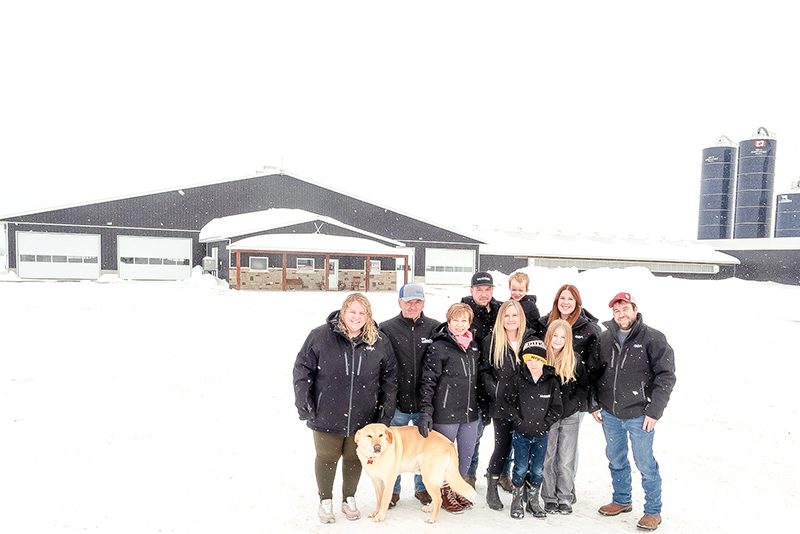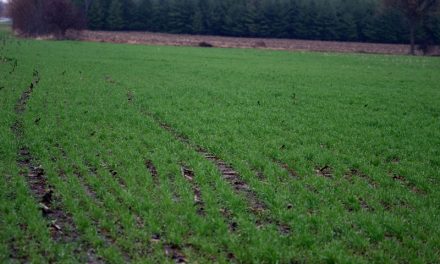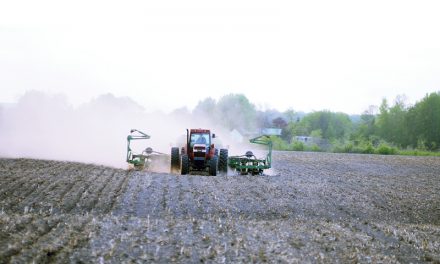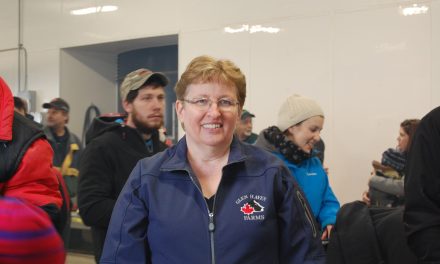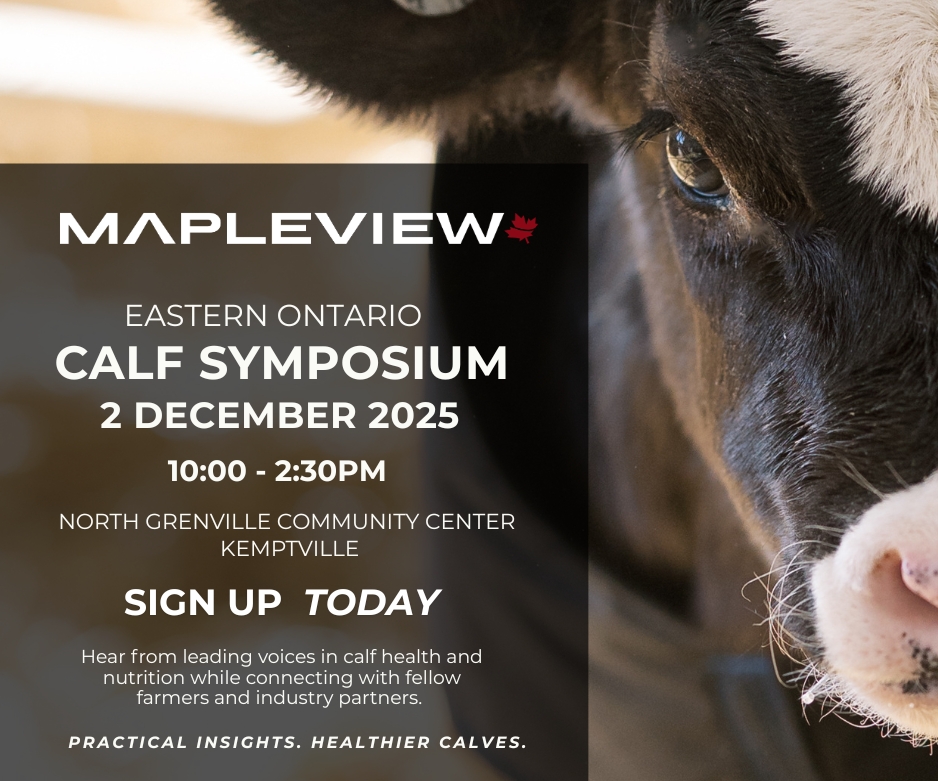In every possible way, Cecilbay Farm can be considered a true family farm. Front row (from left) Sara, Buckshot, Lucy, Charlene, Cole, Delilah. Back row (from left) Gord, Travis, Myles, Alanah and Devyn. Courtesy Photo
NAVAN – On May 24, 2022, a widespread wind storm known as a derecho travelled across Ontario and Quebec, causing heavy damage. In Ottawa wind speeds were recorded at up to 190kms/hr.
One of the hardest hit areas was in and around rural Navan, where several farms were heavily damaged. Cecilbay Farm, owned by the McFadden family since 1848 was one of the most severely damaged.
The farm was founded by Gordon McFadden’s great-great-grandfather in 1848. Gordon McFadden bought the farm in 1986 and has run it ever since with the help of his sons Devyn and Travis who are now partners.
When we spoke with Gord and Lucy McFadden in February of this year, they explained the events of the day of the storm in great detail. Living through an event like that tends to leave its mark on you.
Gordon McFadden was in the barn the day of the storm and literally had much of it come down around him. “It was pretty devastating,” he said. We lost three or four cows the day of the storm when the barn collapsed.
“As time went on, we lost more and more, probably half, at least half the herd, by the time all was said and done.”
Lucy, Gordon’s wife of 40 years described the damage. “The whole dairy barn, that dairy house was collapsed. The four silos were severely damaged. We had two coveralls, a machine shed, another shed across the road lost its roof, and it was only eight years old.”
There was also the damage to the family’s residences, but fortunately no one was hurt, and even more remarkable was how, once the skies cleared, people just started to show up to help.
“Truck and trailers showed up,” adds Gordon, “And by nine o’clock that night, our cows had been moved and were milked. It’s hard to believe how things come together. None of this would be possible without them.”
The McFadden’s started to put plans in place to rebuild almost immediately and had their contractor lined up in under 24 hours.
Both Lucy and Gord state that there was never a thought of not rebuilding, and that decision was made unanimous after discussing it with the rest of their family.
“Gordon and I were managing the farm, and then in 2017 the boys took over,” said Lucy, so really, the management is Devyn and Travis, and then we’re silent partners to provide support.”
“For them, it wasn’t just a business, it was their passion. A lot of people don’t understand that.”
Prior to the storm they were milking 70 head. “Today, we’re closer to 80 now,” said Gordon. “But because of the quota situation, we can’t expand too quickly. We’re buying quota every month, and we’re slowly getting there. We put in two robots to milk the cows.
We built the barn for 120 so we can expand down the road, so we’re not at full capacity, by any means.”
As things came together the McFadden’s tried to think of a way to show their gratitude to all the friends, neighbours, and family who had helped them turn a tragedy into a triumph.
They thought an open house would at least in a small way show how grateful they were, and to also help the suppliers who played a vital role in the recovery by allowing them an opportunity to show some of their products in action. The robotic feed cart, for example is a GEA F4500, the first one in North America, and there are two GEA R9500 milking robots as well.
The family was told that they should expect a large crowd of people to show up on March 29th, the date of the open house, but the night before there had been a forecast of snow, rain and freezing rain, and at one point they wondered if they should cancel the event. Fortunately, most of the storm missed the Ottawa area, and things went ahead as planned, with even more visitors than they could have dreamed of.
Cars were parked on the property, but also both sides of Trim Road, approximately 750 metres each way and also on McFadden Road. Every time a spot would open up, there would be someone there to quickly fill it in.
Their suppliers were on hand to answer any questions about the computerized system, which was operating as usual that day (the cows didn’t seem bothered by the extra attention and they formed a steady parade in and out of the milking robots). There was also a food truck on hand catering the event, as well as hot and cold drinks and baked goods.
The best part of the day, however, was watching Gordon and Lucy, who said thank you far too many times to count, and who were truly amazed by how many people came to visit.
“It’s overwhelming, really, really it is, overwhelming,” said Lucy. “We’re happy it turned out the way it did. Kudos to everyone, friends and family, everybody. It’s nice to see everyone, and just to thank everyone, because none of this would be possible, but for our neighbours and friends.
“You know, our banker, he was, well, how many people can say their banker called them the day of the storm to see what they could do. Yeah, not too many people can say that.”
“It’s to showcase all the different equipment, how it works,” said Gordon. “And you know, we’re so proud of everyone that came together to help and today we want to be able to really see them. It’s our opportunity to thank our neighbours and friends, and family because, it wouldn’t be possible without them. You didn’t have to make any calls; you didn’t have to call anyone. Everyone just came. We can’t thank everyone enough.

